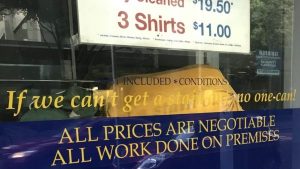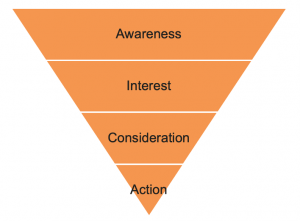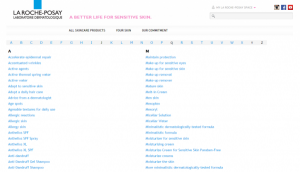We all have to start somewhere. Every day is an epic battle against the goliaths in your market for you and your team. Maybe you’re the little guy or gal who’ve cornered your market in a geographic region, and the giants have decided your pastures look attractive. Perhaps you fought and clawed your way up with dedication and focus on clients and prospects they’ve undervalued. In any case, your firm must have solid differentiators, focus and relevance, or you wouldn’t have made it this far.
Last month I wrote about how your firm’s website is connected to the rest of your marketing initiatives. But what if you’re just getting started? What if you’re the underdog? You too can walk among the giants with the powerful slingshot of effective online marketing.
Start here: Name your expertise
Fighting the industry giants is hard work, but it can also naturally breed innovation and edge the behemoths envy. To get off on the right foot, your firm should clearly identify its brand position. As long as your position is very clear and direct, you can use it as a powerful tool to rally your troops. To really stand out in the crowd, your brand positioning needs to nail three critical factors. It should be:
- Different
- Focused
- Relevant
This sounds simple, but identifying and clarifying these three points in a way that connects your firm with its audiences is harder than it seems! There is a wealth of valuable content on this topic in Hinge’s Library – but a great place to start would be Lee’s Fredereksen’s current series on the elements of a successful brand.
Starting the discussion internally is a good place to begin, but when your firm is ready to take it to the next level and understand the gaps between internal and external brand perception, its time to do some brand research. Hinge’s primary research on professional services firms highlights that practically all firms (large and small) have opportunities to close these gaps and make communication more relevant. Without objective research, you run the risk of building your firm’s brand on false assumptions. Large firms often wrestle with the sheer momentum of internal “kool-aid” and must always work to stay aware and responsive to market shifts. As a smaller firm, your challenge might be assembling the resources to undertake research in the first place. Although this might seem like a hefty investment, our research shows that it is a critical element to high-growth firms (the firms that grow significantly faster than average).

Once you’ve got a handle on your firm’s position – the next step is to consider the audiences that you’re speaking to.
You talkin’ to me? Who are your audiences?
You can be sure that the giants constantly analyze their audiences. They have the resources to do it and it might be the reason that they’re moving into your market.
Understanding your firm’s audiences is a key ingredient to achieving greater visibility and competing against bigger competitors. Think of it like this: the more focused you can be when speaking to your audiences through effective online marketing channels, the better chance you will have at being relevant and engaging.
Ultimately this will allow your firm to build trust and recognition as a leader in your specific areas of expertise regardless of your size. In some cases, being a highly focused smaller firm has the advantage over a larger, more less focused (or more all-encompassing) competitor.
Speaking of those competitors, it is also crucial to understand where and how they are interacting with your audiences. With an objective competitive analysis, you and your team can assess competitors’ strengths and weaknesses and look for opportunities to differentiate and target specific audiences.
Start the conversation: Your engagement model
Its all about people and relationships. If I had a nickel for every time I heard that… (I’d still be on vacation somewhere sunny)! This statement holds true for everyone, large and small, strong or weak. It’s the exact opposite of a differentiator. That’s not to say its not important, but as the disruptor in your market, you’ll need to bring some special powers to the fight. The way people and relationships are defined in today’s AEC market goes way beyond lunches, hand-to-hand schmoozing and so on.
Our most recent research shows that 81.5% of professional service firms receive referrals from sources they have not directly worked with. In that group, 94.5% of these referrals were based on expertise, reputation and visibility.

That speaks to the power of building a strong reputation for your brand and its expertise. While there are lots of ways to do this, both on and offline, one of the most cost-effective ways to build your reputation as a leader in your field of expertise is through your online engagement plan.
The ingredients: Your content mix
You and your team (slingshots in hand) are ready to go slay some giants. Hope you’ve got a plan!
We’ve identified the opportunity and your audience, now you need to determine what content will be most effective in reaching them. This is a good point to establish what types of content your team can realistically produce on its own versus bringing in outside help.
Before you begin, gather all the content types you are considering and organize them into a content funnel.
- Do you have enough content types that cast a wide net and help increase visibility?
- Do you have engaging content for prospects that are beginning to educate them on your brand and expertise?
- Finally – do you have valuable content for your audiences to download in exchange for their contact information? Touchdown! You have a new lead to nurture in your business development process.
Next Steps
A great plan is nothing without execution. So where do you and your team go from here? Consider these starting points:
- Internal vs. external resources. Do you have the expertise internally to pull-off an effective online marketing strategy? Where could you and your team use training? Where is it more effective to pull in a specialist?
- Create a sustainable process. You and your team might come out of the gates like gangbusters, but what happens six months from now? A year? Consider how you will continue to justify the resources required for an effective and sustainable online marketing effort. Are you measuring results in an actionable way? Are you reporting those results back to your broader team and subject matter experts (who are supporting your efforts on top of their day–to-day efforts)? Make sure you keep the internal and external resources you need by setting realistic expectation, demonstrating results, and delivering leads.
- Map out a realistic editorial calendar. Keep your teams rowing in the right direction and consider incorporating keywords as you map out your editorial calendar. Here’s an idea of what your calendar might look like:
Level the playing field: Go get ‘em!
You’ll face different challenges as a large or small firm in your industry. But the opportunity exists for both types of firms to drive greater engagement and deliver more leads with an effective and accountable online marketing effort. Working with firms on both ends of this equation on a daily basis, I can tell you that the grass always seems greener on the other side! Next time around we’ll take a look at this from Goliath’s perspective. Same bat-time, same bat-channel.
Digital & Social Articles on Business 2 Community
(48)











